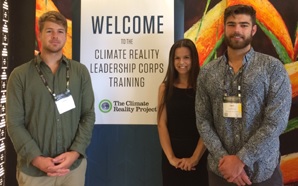Students keen to take climate change action after training in the Philippines

Learning about climate change in the Philippines, which is particularly vulnerable to devastating weather-related events, and seeing the disparities of life in its capital city Manila, was an eye-opener for Victoria Law students Callum Beattie and Jack Barclay.
Callum and Jack joined about 800 other climate champions, from 58 countries, to attend Al Gore’s Climate Change Reality Leadership Training in Manila, in March.
Reader in Law Catherine Iorns encouraged the students to attend the training, run by the Nobel Peace laureate, former US Vice President and outspoken climate change champion, Al Gore. She had previously done it also.
The pair have returned to Wellington keen to make a mark in climate change “education, analysis and action”.
“There is cause for optimism from the Paris agreement, but its success depends on its implementation domestically,” Jack says.
The Paris Agreement, concluded in December 2015, is the first global agreement to address climate change, with 188 countries involved. New Zealand signed the agreement on 22 April 2016, the first day it was open for signature at the United Nations in New York.
“The Philippines conference was three days and there was a lot of information presented,” Callum says. “In our own domestic context, the key takeout was tools for communicating depending on different audiences and the difference between needing to hear and wanting to hear. It was related to us as a complexity budget, time budget and hope budget.”
“Education is one of the most important tools,” Jack says. “We want to use the skills we learnt at this conference to educate at a high school and tertiary level, as well as the wider public.
“It is really important for us to get young people involved in talking about climate change.”
Callum says that for law students, climate change agreements, such as the Paris agreement, present a lot of law and policy and interesting aspects for them to learn about and take on board.
The launching pad for their own climate change work is the Victoria University of Wellington Climate Change Clinic. The Clinic began at the Faculty of Law in March 2015, with students creating a website in advance of the Climate Change Conference in Paris (COP21) aimed at deconstructing and analysing the agreement (www.paristext2015.com).
“This year, we would love to get the Clinic as a standalone institution that is interdisciplinary, with people from other faculties involved,” Jack says. “We held a meeting recently and people from other parts of the university with an interest in climate change attended. The goal of the Clinic is to facilitate student engagement with the issue of climate change through a range of initiatives.
“We are focused on effective action to reduce climate change risk and to hold decision-makers accountable for what they’ve agreed to [in Paris].”
New Zealand’s 2030 target, tabled during the Paris negotiations, sees it commit to reducing carbon emissions to 30 percent below 2005 levels.
While the training conference was free and food at its events was provided, the students had to be accepted on application to attend and pay their own way to the Philippines. Callum and Jack say Victoria University of Wellington was the only New Zealand university represented there.
“It was a really important experience,” Callum says. He is keen to continue his learning at COP22 in Morocco in November this year.
Catherine Iorns says the Climate Change Clinic, which she supervises, will be expanding its scope this year to include COP22 in Morocco, further monitoring the Paris agreement and making a movie about the experience of a Law student in Paris for COP21.
"As a lecturer you can really only hope to give students some ideas and encouragement,” she says. "It's really exciting to see them so enthusiastic, picking up these ideas and turning them into actions - the Clinic work and Climate Change Reality Leadership Training are an excellent addition to their law studies.”
